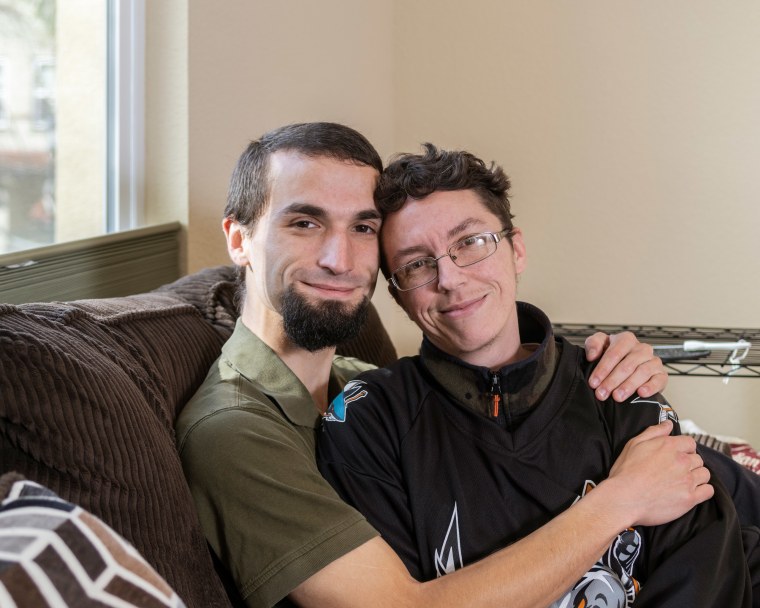Rick Zentler can’t wait to have biological children — just not in the near future. The transgender man knew he needed to plan ahead to make this a reality, so he froze his eggs just before undergoing treatment that would soon render him infertile.
Zentler, 31, who was assigned female at birth, underwent a hysterectomy and hormone replacement therapy through testosterone soon after with the idea of starting a family on his own terms when the time was right.
“I want four,” he said of having kids. “Because I have 34 eggs on ice, I joke that if I was rich, I could start my own army.”
Zentler, an MBA student at San Jose State University in California, says he plans to hire a female surrogate to carry his children eventually.
Egg freezing is becoming an increasingly popular option — in 2009, 475 women froze their eggs; in 2016, that number grew to 7,300, according to the Society for Assisted Reproductive Technology — and the trend has extended to trans men as well.
Because testosterone can reduce fertility in trans men over time, and since some may undergo hysterectomies, egg freezing is an appealing option for those who wish to have biological children. There are challenges, however, unique to trans men. They often find themselves navigating fertility clinics that are unaccustomed to catering to the needs of trans patients. They are also sometimes asked unnecessary and insensitive questions about their gender identity.

Maya Scott-Chung, program director for SprOUT Family, a nonprofit that supports LGBTQ people through the family building process, told NBC News she is not confident that trans people are being properly informed about their reproductive options.
“I still think it’s disturbingly erratic around providers properly educating transgender people about their family building options and around fertility preservation,” Scott-Chung said. Many providers, she noted, are putting trans people “through hormones and/or surgeries” that can “potentially sterilize people without educating them about the impact of it.”
The guidelines from the World Professional Association for Transgender Health, Fenway Health and the Endocrine Society, among others, advise health providers to make trans patients — both adults and adolescents — aware of any impact to future fertility that transition-related care may have as part of the informed consent process. Health care professionals involved in care related to gender transition should discuss reproductive options with transgender patients prior to them taking hormones, according to the guidelines from WPATH.
Vega Darling, 39, a trans documentary-filmmaker who lives in Atlanta, said he has been on hormone replacement therapy since 2004. He would have liked to have had his own children, he said, but his reproductive glands are no longer viable.
“I really wish that people had just treated me as they would have treated any other person that had come into the office and discussed just reproductive options,” Darling said, “and just realized that both queer and trans people also want to have children.”
When combined with hormone blockers — drugs that delay puberty until an adolescent is old enough to decide whether they want to take cross-sex hormones — fertility is far less likely since the reproductive organs do not develop, unless the patients stop taking blockers, according to Dr. Amanda Adeleye, a reproductive endocrinologist at the University of California, San Francisco.
Data regarding how many trans men are seeking egg-freezing services is sparse, since clinical systems tend to only track people based on their sex assigned at birth, but Scott-Chung said she believes more trans people are seeking out this type of care. She estimated that about 15 of the inquiries received through SprOUT Family over the last year were from trans men seeking help on how to freeze their eggs, which made up about a quarter of the inquiries they received in total.
Alex, 20, a transgender sophomore at Texas A&M University, started fertility treatments in mid-February. When he decided to go on testosterone, Alex — who asked that his last name not be printed because his family is not yet aware he is medically transitioning — went to a local Planned Parenthood for a consultation. The clinician told him about egg freezing during the initial consultation, Alex recalled, but he said he had already planned on doing it.
“When I realized I was trans, I started watching a ton of transition compilations that people have posted on YouTube, and a couple of trans men had mentioned that they froze their eggs,” he explained. “That made me think that, OK, maybe this idea of me having a child, genetically at least, is possible.”
The egg-freezing process, which typically includes vaginal ultrasounds and taking fertility drugs that trigger heavy menstrual cycles, can exacerbate a trans man’s discomfort. And many fertility clinicians, who primarily interact with women, may not understand how to give them the appropriate care, according to experts.
Hayden Wolff, 20, a computer science major at Tufts University in Massachusetts, got his eggs frozen at a clinic in Boston in 2018 before he began taking testosterone. He described the experience as “horrible from start to finish.” He explained to staff that he is transgender, but said nurses and doctors frequently referred to him as a woman anyway. Others, he said, seemed overly fixated on his trans identity, often asking unnecessary questions that he felt violated his privacy.
“I just wanted to get it done,” Wolff said. “I wanted to get it over with, and I didn’t want my trans-ness to necessarily be a factor. I wanted to not be called a woman, and I wanted to get my eggs out, and that was it.”
FINANCIAL BURDEN
Many private health care plans in the United States lack coverage for some, if not all, transition-related care, such as surgery and cross-sex hormones, and may or may not cover fertility treatments.
While a few states have passed legislation requiring insurers to cover fertility preservation for people undergoing cancer treatments, none has been introduced that would specifically require fertility preservation for people preparing to undergo cross-sex hormone treatment or gender confirmation surgery.
Outside the U.S., there has been some progress. The Equality and Human Rights Commission in England is preparing to sue the National Health Services — the nation’s publicly funded national health care system — over its failure to offer fertility preservation services to trans patients. But efforts to pass legislation that would require insurers to cover fertility preservation for trans people in the U.S. have been practically nonexistent.
Due to the lack of coverage, trans men often pay significant out-of-pocket costs to freeze their eggs. On average, one fertility treatment for egg harvesting can cost $15,000, with an additional cost of $275 per year for storage, according to Dr. Aimee Eyvazzadeh, a fertility specialist in San Francisco who has treated transgender patients. This cost is in addition to the transition-related surgeries and hormone therapy that many trans men undergo, which can cost between $25,000 and $75,000, according to the Human Rights Campaign.
And trans men are starting to transition at younger ages, which means many are seeking care during a time in their lives when it is least affordable, according to Eyvazzadeh.

“I think the biggest barrier to access to care isn’t just the clinic, it’s the cost, because you’re dealing with a person who a lot of the time is disowned by their family, and they don’t have the finances, or let’s say they’re in college,” Eyvazzadeh explained.
Zentler began his transition in his early 20s, when he got a mastectomy, which he paid for himself. He held off on taking testosterone injections until he could save enough money to freeze his eggs. He would eventually spend about $9,000 to freeze them, he said, because his ex-husband’s insurance, which he was on at the time, did not cover fertility treatments.
“I’d been holding off on doing the hormone replacement therapy, because I didn’t want to mess any of the reproductive system up,” Zentler said.
He got his eggs frozen in December 2015 and began testosterone injections shortly afterwards. He also got a hysterectomy to stop his period, which he described as “really dysphoric.” While the $20,000 hysterectomy was covered by his ex-husband’s insurance, Zentler said he still paid about $3,000 out of pocket.
Lack of family support can also impact the costs of care for transgender men. Alex said his mother’s health insurance would have covered both his transition-related care and egg freezing, but because his parents do not support his gender identity, his mother threatened to remove him from her health plan if he used it for his transition.
Alex said he will pay for his transition-related care himself and start hormone replacement therapy as soon as his eggs are frozen.
AN UNPREDICTABLE FUTURE
Trans men who freeze their eggs grapple with a significant amount of uncertainty. If they plan to rely on a female partner to carry their baby through IVF, which is often not covered by insurance, it can cost between $12,000 and $15,000. If they do not have a female partner to carry their child, they must hire a surrogate, which can cost tens of thousands of dollars or more. Surrogacy laws vary state by state, which can further complicate the process.
Even if they do find a female partner or a surrogate, there is no guarantee she will become pregnant. According to the latest statistics from the Centers for Disease Control and Prevention, only 21 percent of cycles among patients using their own frozen eggs ultimately ended in live births. The Society for Assisted Reproductive Technology, which uses a slightly different metric than the CDC, showed odds that top out around 11 percent, depending on age.
For Zentler, who is married to a man, finding a surrogate is the only option. He estimates it will cost him anywhere from $50,000 to $90,000. He currently doesn’t have medical insurance, he added, but hopes to have a plan some day that will help pay for surrogacy.
Despite their challenges, all the men said they feel better knowing they have the option of having biological children some day — and are excited to become fathers.
“Oh, that sounds nice,” Zentler sighed. He added: “I’m worried about the cost. So worried.”




